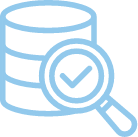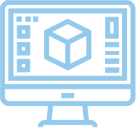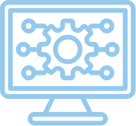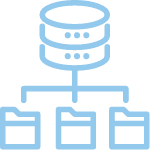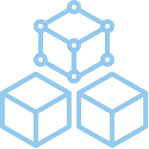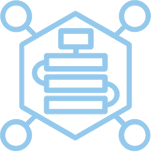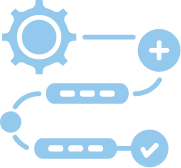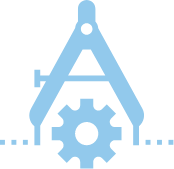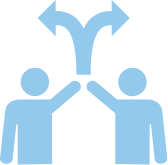2011
Founded
Year
50+
Achieved
Awards
98%
Clients Retention
100+
Core
Team
120+
Projects Implemented
40%
Business Efficiency with AI
Computer Vision Expertise
Object Detection, Tracking, and Labeling
Computer Vision solutions make it possible to identify, track, and label objects in images or videos with precision.
By processing visual data intelligently, businesses can detect patterns, monitor movements, and classify objects to support automation and data-driven decisions.

Recommender Systems Powered by Visual Search
Use Computer Vision solutions with visual search to deliver recommendations that align with each customer’s preferences and behavior.
By analyzing visual similarities in images, products, or user interactions, the system suggests items that are more relevant and engaging, helping increase conversions and long-term loyalty.

Visual Inspection for Defect Detection
Automated visual inspection powered by Computer Vision solutions helps identify product defects, detect cargo damage, and maintain consistent quality across every production stage.
By analyzing images and video feeds in real time, businesses can reduce manual inspection time, prevent costly errors, and ensure every item meets required standards before delivery.

OCR & Data Capture
Streamline document handling with OCR and Data Capture solutions that extract information accurately from invoices, forms, and reports.
These Computer Vision solutions automate data entry, reduce human error, and make information easily searchable, saving time and improving workflow efficiency across departments.

Pose Estimation
Pose Estimation solutions use Computer Vision to track and analyze human movement with precision. By interpreting body posture, motion, and alignment in real time, businesses in fitness, sports, healthcare, and ergonomics can deliver accurate feedback, improve training outcomes, and enhance overall performance.

Video Analysis for Automated Surveillance
Video Analysis solutions powered by Computer Vision enable real-time monitoring and automated detection of unusual or violent behavior.
These systems strengthen security and safety measures by identifying risks early, alerting personnel instantly, and supporting faster, more informed responses in public and private environments.
Our Computer Vision Software Development Process
-
Data Validation and Enhancement
Every Computer Vision project starts with ensuring the data is complete, consistent, and reliable. The process includes assessing image and video quality, cleansing inaccurate records, and relabeling datasets where needed. This foundation guarantees that the models built later deliver precise and dependable results for real-world applications.
Key Steps:
- Data Assessment: Review all image and video inputs to confirm accuracy and completeness.
- Data Cleansing: Remove errors, duplicates, and irrelevant elements for higher model reliability.
- Relabeling: Correct or enhance labels to improve the quality of training data.
- Quality Assurance: Validate that the enhanced dataset meets the standards required for model development.
-
Customized Solution Design and Platform Optimization
Each Computer Vision solution is designed around your business objectives and technology environment. The development process focuses on creating models and interfaces that perform seamlessly across the platforms and devices you rely on. By optimizing every component for speed, accuracy, and compatibility, the solution delivers consistent performance and user satisfaction.
Key Steps:
- Requirement Alignment: Translate your business goals and operational needs into a tailored Computer Vision framework.
- Architecture Design: Develop solution architecture suited for your specific use cases and scalability needs.
- Platform Optimization: Adapt software for optimal performance across web, mobile, and embedded systems.
- Performance Validation: Test functionality under real-world conditions to ensure efficiency and reliability.
-
Bespoke Computer Vision App Development
Develop Computer Vision applications built specifically for your business goals and operational workflows. Each solution combines advanced AI models with custom design to ensure accuracy, scalability, and real-world usability. Whether it involves object detection, visual search, or real-time video analytics, every application is engineered to solve practical challenges and deliver measurable business impact.
Key Highlights:
- Tailored Architecture: Designed to match your unique processes and data ecosystem.
- AI Integration: Uses advanced Computer Vision models for reliable visual interpretation.
- Cross-Industry Usability: Adaptable for sectors such as manufacturing, healthcare, logistics, and retail.
- Scalable Deployment: Built to grow with your business and evolving data needs.
-
Seamless System Integration and Ongoing Support
Successful Computer Vision implementation depends on smooth integration and reliable long-term support. After development, the solution is aligned with your existing systems, workflows, and data pipelines to ensure consistent performance. Dedicated technical support and regular maintenance keep the application running efficiently, helping your team focus on business goals without disruption.
Key Highlights:
- Smooth Integration: Align Computer Vision software with your current infrastructure and tools.
- Comprehensive Support: Receive ongoing technical guidance and troubleshooting assistance.
- Performance Monitoring: Track and optimize system performance over time for sustained accuracy.
- Continuous Improvement: Apply updates and enhancements to keep the solution aligned with evolving business needs.
Our Computer Vision Software Service Offers
-
Data Set Preparation
High-quality data is the foundation of every accurate Computer Vision model.
Data Set Preparation involves collecting, annotating, and validating images or videos to ensure that each algorithm learns from consistent and reliable inputs.
With precise labeling and verification, your models can recognize patterns, detect objects, and deliver results with greater accuracy and speed.
-
Application Development
Build powerful and scalable Computer Vision applications that align with your business objectives and operational workflows.
Each solution is developed to handle complex visual data, ensuring fast processing, accurate detection, and reliable performance across different environments.
Whether for automation, analytics, or user interaction, these applications are designed to deliver measurable efficiency and long-term value.
-
Model Design and Performance Enhancement
Create high-performing Computer Vision models designed for accuracy, speed, and scalability.
Using advanced frameworks such as OpenCV and TensorFlow, along with GPU acceleration, each model is optimized to process complex visual data efficiently.
This ensures faster training, improved object recognition, and reliable real-time performance across your machine vision applications.
-
Seamless System Integration
Integrate Computer Vision solutions smoothly into your existing software and operational infrastructure.
Each integration is designed to maintain data consistency, minimize disruptions, and ensure the new system works in harmony with your existing tools.
This approach helps businesses achieve faster adoption, improved performance, and reliable scalability across departments.
Our Computer Vision Work
We specialize in making AI applications better, using custom build computer vision solutions to see and understand images, and creating smooth user experiences.
-
Data Annotation and Model Training
- Accurate data annotation is the foundation of effective Computer Vision development.
- Each image or video frame is labeled with precision to ensure that models learn to recognize patterns, objects, and contexts correctly.
- Once the data is prepared, model training and validation are carried out using advanced AI frameworks to achieve high accuracy and reliable performance.
- This process ensures your Computer Vision solution delivers consistent, real-world results.
-
OCR and ICR Implementation
- Optical Character Recognition (OCR) and Intelligent Character Recognition (ICR) technologies transform how businesses handle printed and handwritten information.
- By integrating these tools into industrial and enterprise systems, organizations can automate data extraction, reduce manual entry, and improve the speed and accuracy of information processing.
- This results in smoother workflows, lower operational costs, and more reliable data for decision-making.
-
Iterative Image Labeling
- Iterative Image Labeling ensures accuracy and consistency throughout the model training process.
- By using refined algorithms and training datasets, each labeling cycle improves upon the last, reducing errors and enhancing data quality.
- This continuous improvement process helps Computer Vision models recognize patterns more effectively, resulting in reliable and high-performing visual analysis.
-
Generative Adversarial Networks (GAN)
- Generative Adversarial Networks (GAN) enhance Computer Vision capabilities by generating synthetic data that reflects the same patterns and characteristics as real-world datasets.
- Through this method, additional training data is created to improve model performance, balance datasets, and strengthen prediction accuracy.
- This approach expands the possibilities for analysis, especially in scenarios where real data is limited or difficult to obtain.
-
Content-Based Image Retrieval
- Content-Based Image Retrieval uses Computer Vision techniques to search and organize large image databases by analyzing visual features such as color, texture, and shape.
- Instead of relying on metadata or tags, this approach identifies and retrieves images based on their actual visual content.
- It allows faster and more accurate image searches, helping businesses manage digital assets efficiently and enhance user experience across platforms.
-
Emotion Detection and Analysis
- Emotion Detection and Analysis systems use advanced Computer Vision and machine learning to interpret facial expressions with precision.
- By analyzing subtle cues such as facial movements and micro-expressions, these solutions identify emotional states in real time.
- Businesses across healthcare, retail, education, and customer service can apply this technology to understand user behavior, personalize experiences, and improve engagement outcomes.
-
Image Recognition and Detection
- Image Recognition and Detection solutions use deep learning and Computer Vision to identify objects, patterns, and features within images with high accuracy.
- By converting unstructured visual data into structured, actionable information, businesses can automate classification, improve analytics, and make faster, data-driven decisions.
- This capability supports industries such as healthcare, manufacturing, retail, and security, where precision and speed are essential.
-
Video Analytics for In-Depth Insights
- Video Analytics powered by Computer Vision enables detailed examination of both spatial and temporal events within video streams.
- These systems detect motion, identify tampering, recognize shapes, and analyze frame-level changes to extract meaningful insights.
- With techniques such as Video Error Level Analysis, Dynamic Masking, and Motion Detection, organizations can enhance surveillance accuracy, optimize operations, and make informed, data-backed decisions based on real-time video intelligence.
-
Object Detection, Tracking, and Labeling
- A structured data pipeline is essential for accurate Object Detection, Tracking, and Labeling.
- By generating high-quality training data, Computer Vision systems powered by machine learning can locate, classify, and monitor objects in images and videos with precision.
- This process improves recognition accuracy, reduces false detections, and enhances the overall performance and efficiency of your visual applications across different environments.
-
Visual Search and Recognition
- Visual Search and Recognition solutions use Computer Vision to identify, compare, and locate objects or patterns within images and videos.
- These systems enable faster and more accurate retrieval of visual content, improving search relevance and user interaction.
- Businesses can apply this technology for e-commerce product discovery, visual recommendations, digital asset management, and content organization, turning image-based data into actionable insights.
Benefits of Computer Vision
Harnessing custom-built computer vision solutions offers a multitude of practical advantages with minimal resource investment.
-
Streamlined and Accelerated Processes
Achieve process automation, enabling swift product evaluations and heightened efficiency.
-
Cost Savings
Realize cost reductions that enhance the profitability of your services and products.
-
Elevated Precision
Elevate the precision of data-driven operations while mitigating errors.
-
Top-Tier Outcomes
Optimize workflows and elevate the quality of customer service, yielding high-quality results.
Why Choose Cloudester?
Using custom computer vision solutions brings many practical benefits with little effort. These tools can help you analyze images and videos more effectively. With our solutions, you get better insights and improve your business operations without needing a big investment.
-
Advanced Computer Vision Models
We employ convolutional neural networks to create efficient algorithms, drawing inspiration from the workings of biological neural systems.
-
Tailored Solutions
We don’t settle for ordinary. Our solutions are customized to align perfectly with our clients’ specific requirements and the characteristics of their data.
-
Robust Cloud Infrastructure
Our skilled ML engineers, consultants, and infrastructure architects collaborate to ensure optimal performance for our clients.
-
Highly Seasoned Team
We are dedicated to excellence in every aspect of our work, providing our clients with top-tier solutions in the development of computer vision applications.
Computer Vision Tools and Frameworks Development Services
Our Expertise in AI Models

GPT-4
OpenAI’s GPT-4 sets the benchmark for complex problem-solving with its advanced reasoning and extensive general knowledge. It excels in tasks like nuanced text generation, summarization, multilingual communication, and creative ideation, making it a versatile tool for various industries.

GPT-4o
This advanced multimodal model excels at processing text, images, and audio, offering businesses versatile applications for communication and automation.

LLaMA 2
Meta’s LLaMA 2 is a state-of-the-art large language model designed for high-performance AI applications. It supports customization, enabling businesses to tackle challenges like content generation, problem-solving, and text summarization with precision.

PaLM2
Google’s PaLM2 leads the way in intricate reasoning tasks, such as code interpretation, mathematical solutions, and multilingual translation. It’s the perfect model for enterprises looking to enhance productivity through AI-powered insights and operations.

Claude 2
Anthropic’s Claude 2 offers a safer and more ethical generative AI approach. It is ideal for organizations prioritizing compliance, privacy, and responsible AI while delivering powerful text analysis, summarization, and conversational capabilities.

Gemini
Gemini, Google DeepMind’s latest model, combines text, image, and speech processing into a seamless multimodal AI platform. Its ability to integrate and process diverse data types makes it perfect for advanced applications in marketing, healthcare, and customer experience.

MidJourney v6
MidJourney v6 revolutionizes visual creativity with its ultra-realistic image generation capabilities. From marketing campaigns to product design, this model offers high-quality, detailed visuals that cater to the growing demand for impactful visual content.

DALL.E
OpenAI’s DALL·E generates stunning and lifelike images from text prompts. It supports businesses with image creation, modification, and variation, offering unparalleled versatility for industries like e-commerce, media, and design.

Whisper
Whisper by OpenAI provides exceptional speech recognition capabilities, including language identification and multilingual speech-to-text conversion. It’s a key tool for transcription services, voice-based applications, and real-time communication tools.

OpenAI Sora
OpenAI’s new text-to-video AI model enables businesses to generate high-quality videos from text prompts, perfect for marketing campaigns, e-learning platforms, and creative workflows.

ImageBind
Meta’s ImageBind integrates text, audio, video, and other modalities to deliver rich, cross-domain insights. It is particularly beneficial for industries like retail, logistics, and marketing, enabling a unified understanding of complex datasets.

Stable Diffusion
Stable Diffusion remains a powerful image generation model, excelling in tasks like inpainting, outpainting, and creative image synthesis. Its scalability and efficiency make it an excellent choice for businesses seeking high-quality visual outputs.
Our AI Services Technology Stack

Tensor Flow

MediaPipe

OpenCV

Nvidia CUDA

Keras

Caffe
Our Engagement Models
-
Dedicated AI Development Team
Our proficient AI and blockchain developers are fully immersed in leveraging cognitive technologies to provide exceptional services and solutions to our clients.
-
Extended Team Enrichment
Our extended team model is thoughtfully designed to support clients in expanding their teams with the necessary expertise for AI-driven projects.
-
Project-focused Strategy
Embracing our project-based approach, our skilled software development specialists collaborate directly with clients and the triumphant realization of AI-infused projects
Get Started Today

Contact Us
Complete our secure contact form, Book a calendar slot and set up a Meeting with our experts.

Get a Consultation
Engage in a call with our team to evaluate the feasibility of your project idea. We’ll discuss the potential, challenges, andopportunities.

Receive Cost Estimates
Based on your project requirements, we provide a detailed project proposal, including budget and timeline estimates.

Project Kickoff
Upon agreement, we assemble a cross-disciplinary team to initiate your project. Our experts collaborate to launch your project successfully.
Start a conversation by filling the form
Build your top-notch AI product using our in-depth experience. We should discuss your project.
Frequently Asked Questions
Computer vision software development involves creating applications and systems that enable computers to interpret and understand visual information from the world, such as images and videos.
Computer vision software can automate tasks, improve accuracy, enhance security, and provide valuable insights from visual data, which can boost efficiency and decision-making.
Various industries, including healthcare, manufacturing, e-commerce, marketing, logistics, and more, can benefit from computer vision solutions.
Image analysis involves extracting insights and information from images, while object detection focuses on identifying and locating specific objects within images or videos.
Yes, computer vision software can be tailored to your specific requirements, ensuring it meets your business needs effectively.
Accuracy varies based on the specific algorithm and the quality of training data, but modern computer vision algorithms can achieve high accuracy rates.
Machine learning is a fundamental component, as it allows computer vision systems to learn from data and improve their performance over time.
Yes, it can detect defects in real-time during the manufacturing process, ensuring product quality.
CBIR is a technique that retrieves images from a database based on their visual content, making image search more efficient.
Emotion detection analyzes facial expressions to determine the emotional state of a person, allowing for applications in user experience and healthcare.
GANs are deep learning models used to generate new data that closely resembles training data, expanding the dataset for better model training.
Cloud infrastructure offers scalability, data storage, and processing power, which are crucial for handling large amounts of visual data in real-time.
Model updates depend on the changing data distribution and the specific application. Regular retraining is often necessary.
Future trends include advancements in deep learning, improved real-time processing, and more applications in augmented reality and virtual reality.
Impressions
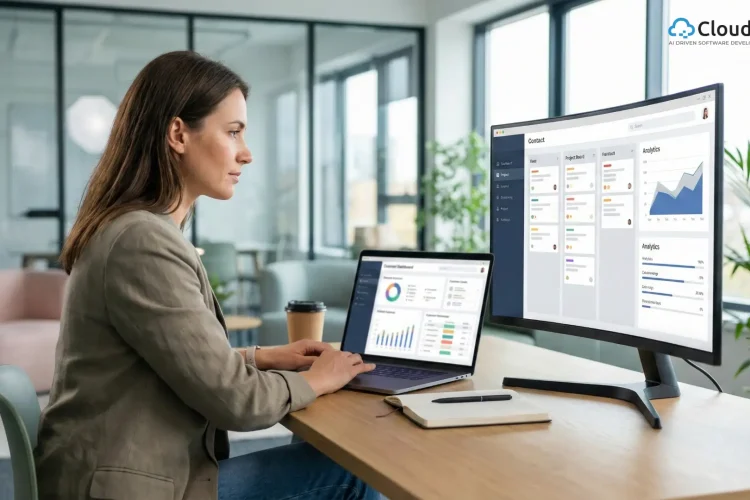
Feb 8, 2026
Software Solutions for Small Business: Types, Benefits & Best Tools in 2026
Running a small business today is no longer possible with spreadsheets, manual paperwork, and disconnected tools. From managing finances and employees to handling customers and daily operations, small businesses need smart, scalable, and cost-effective technology. This is where software solutions for small business play a crucial role. In this blog, you will learn what software […]
Read more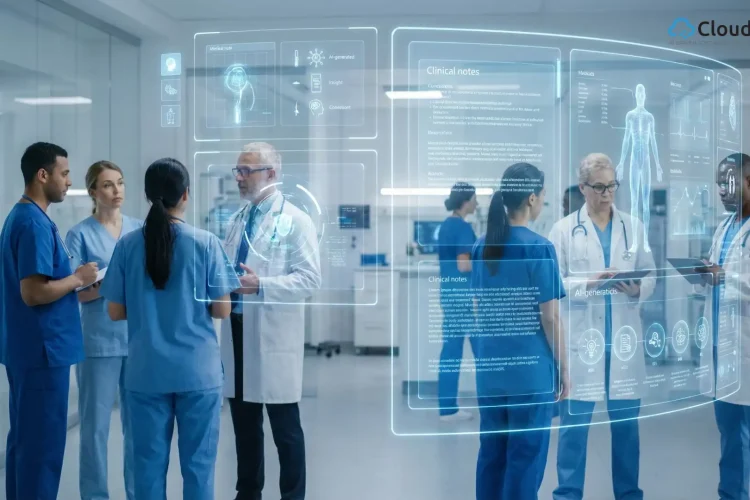
Feb 5, 2026
Epic Generative AI Tools: Features, Use Cases, Benefits
Epic generative AI tools are transforming how healthcare organizations deliver care, manage operations, and reduce administrative burden. By embedding generative AI capabilities directly into its electronic health record ecosystem, Epic enables clinicians, providers, and healthcare administrators to work more efficiently while maintaining accuracy, compliance, and patient trust. These AI-powered features are designed to streamline documentation, […]
Read more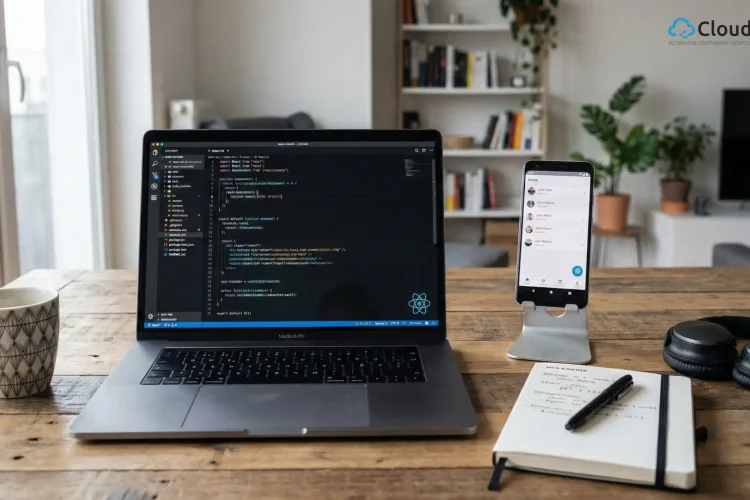
Feb 1, 2026
React vs React Native: Differences, Use Cases, Performance & Which to Choose in 2026
React vs React Native is one of the most common comparisons developers and startups search for when choosing the right technology for their next project. Choosing the correct framework can make or break an application’s performance, scalability, and long-term success. While both technologies come from Meta and share similar concepts, they are designed for very […]
Read more














